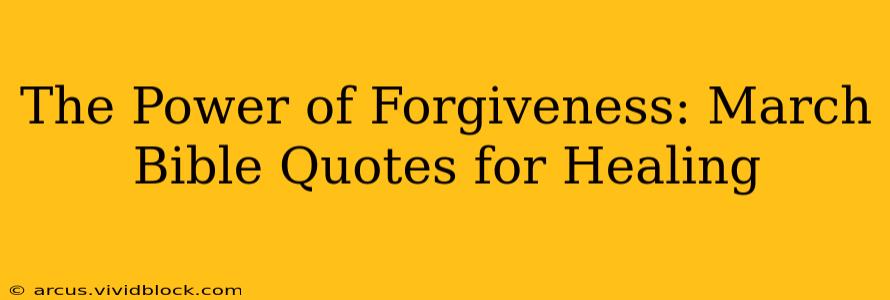The Power of Forgiveness: March Bible Quotes for Healing
March, a month often associated with new beginnings and renewal, provides a perfect time for reflection and healing. For many, this involves confronting past hurts and embracing the transformative power of forgiveness. The Bible, a rich source of wisdom and guidance, offers numerous verses that illuminate the path to forgiveness, both for ourselves and others. This exploration delves into the profound impact of forgiveness, utilizing relevant March Bible quotes to guide our journey toward healing and peace.
What is forgiveness, and why is it important?
Forgiveness is not condoning harmful actions or minimizing the pain inflicted. Instead, it's a conscious decision to release resentment, anger, and bitterness towards someone who has wronged us. It's a process of letting go, freeing ourselves from the emotional burden of carrying negativity. Its importance stems from its profound impact on our mental, emotional, and even physical well-being. Holding onto resentment can lead to stress, anxiety, depression, and even physical ailments. Forgiveness, on the other hand, paves the way for healing, inner peace, and healthier relationships.
March Bible Verses on Forgiveness:
Several powerful scriptures provide guidance and comfort during this journey of forgiveness. These verses, often reflecting on themes of grace, mercy, and redemption, offer solace and direction:
-
Ephesians 4:32: "Be kind and compassionate to one another, forgiving each other, just as in Christ God forgave you." This verse highlights the importance of mirroring God's forgiveness in our own lives. It encourages us to extend the same grace and compassion that we ourselves have received.
-
Colossians 3:13: "Bear with each other and forgive one another if any of you has a grievance against someone. Forgive as the Lord forgave you." This passage underscores the reciprocal nature of forgiveness. Just as we have been forgiven, we are called to forgive others.
-
Matthew 6:14-15: "For if you forgive other people when they sin against you, your heavenly Father will also forgive you. But if you do not forgive others their sins, your Father will not forgive your sins." This powerful passage emphasizes the connection between our forgiveness of others and God's forgiveness of us. It's a call to action, reminding us of the profound consequences of withholding forgiveness.
-
Proverbs 19:11: "Good sense makes one slow to anger, and it is his glory to overlook an offense." This proverb illustrates the wisdom of patience and the virtue of overlooking minor offenses. It suggests that responding with understanding and restraint is a sign of maturity and strength.
How to Practice Forgiveness:
The journey toward forgiveness isn't always easy. It's a process that requires time, patience, and self-compassion. Here are some practical steps to assist in cultivating forgiveness:
- Acknowledge your pain: Allow yourself to feel the hurt and anger. Suppressing emotions only prolongs the healing process.
- Understand the other person's perspective: Try to empathize with the person who hurt you, even if you don't condone their actions. This doesn't mean excusing their behavior but rather seeking to understand their motivations.
- Choose to forgive: This is a conscious decision, not a feeling. It's a commitment to release the negativity and move forward.
- Practice self-compassion: Be kind to yourself during this process. Forgiveness is a journey, not a destination.
Can I forgive someone who hasn't asked for forgiveness?
Yes. Forgiveness is primarily for your own benefit. It's about releasing yourself from the burden of resentment, not requiring an apology from the other person. Choosing to forgive doesn't necessarily mean reconciliation; it means releasing yourself from the emotional grip of the past.
How long does forgiveness take?
There's no set timeframe. Forgiveness is a personal journey, and the time it takes varies greatly depending on the situation, the individual, and the depth of the hurt. Be patient with yourself, and remember that progress, not perfection, is the goal.
What if I can't forgive someone?
Seek guidance. If you're struggling to forgive, seeking support from a trusted friend, family member, counselor, or spiritual leader can be beneficial. They can provide guidance, support, and perspective during this challenging process. Remember, seeking help is a sign of strength, not weakness.
Embracing the power of forgiveness this March, armed with these biblical insights and practical steps, can lead to a more peaceful and fulfilling life. The journey towards healing is a personal one, but the reward—inner peace and freedom—is well worth the effort.

